formerly eScholarship Editions


|
|
|
|
Your request for similar items found 20 book(s). | Modify Search | Displaying 1 - 20 of 20 book(s) | |
| 1. | 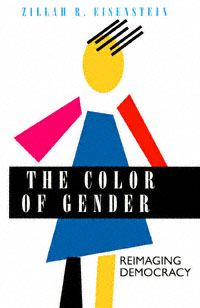 | Title: The color of gender: reimaging democracy Author: Eisenstein, Zillah R Published: University of California Press, 1994 Subjects: Gender Studies | European Literature | Literary Theory and Criticism | Women's Studies Publisher's Description: In this provocative volume, Zillah Eisenstein uncovers the hidden sexual and racial politics of the past decade. Beginning where she left off in her award-winning book The Female Body and the Law , Eisenstein takes the reader on a feminist-inspired road trip, traveling from the thicket of recent abortion decisions to the revolutions of 1989 to the murky chambers of the Anita Hill/Clarence Thomas hearings. Along the way, she enunciates a wholly original conception of individual privacy and sexual rights.Eisenstein brings a range of topics to her discussion: the L.A. riots, crack babies, Murphy Brown, political correctness, the 1992 presidential election, the Gulf War. She seeks to redirect our thinking about democracy away from universal conceptions that mask racial and gender oppression to the specific realities of women and people of color. A respect for multiple differences - as represented in the needs of women of color and their bodies - is, she says, essential to inclusive universal rights. Reproductive freedoms and sexual equality, not abstract notions of civil liberties, provide the wellsprings of a meaningful democratic life. Using this perspective to evaluate the Eastern European revolutions of 1989, Eisenstein finds that the separation between their ideals and the reality of the market system illustrates the failings of democratic theory, especially for women.Eisenstein's controversial arguments will provoke a rethinking of what race and gender mean today. [brief] Similar Items |
| 2. | 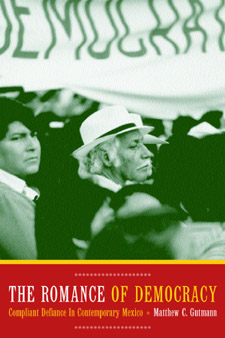 | Title: The romance of democracy: compliant defiance in contemporary Mexico Author: Gutmann, Matthew C 1953- Published: University of California Press, 2002 Subjects: Anthropology | Latino Studies | Latin American Studies | Sociology | Urban Studies Publisher's Description: The Romance of Democracy gives a unique insider perspective on contemporary Mexico by examining the meaning of democracy in the lives of working-class residents in Mexico City today. A highly absorbing and vividly detailed ethnographic study of popular politics and official subjugation, the book provides a detailed, bottom-up exploration of what men and women think about national and neighborhood democracy, what their dreams are for a better society, and how these dreams play out in their daily lives. Based on extensive fieldwork in the same neighborhood he discussed in his acclaimed book The Meanings of Macho, Matthew C. Gutmann now explores the possibilities for political and social change in the world's most populous city. In the process he provides a new perspective on many issues affecting Mexicans countrywide. [brief] Similar Items |
| 3. | 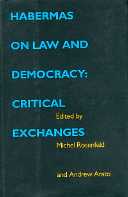 | Title: Habermas on law and democracy: critical exchanges Author: Rosenfeld, Michel 1948- Published: University of California Press, 1998 Subjects: Philosophy | Law | Politics Publisher's Description: In the first essay, Habermas himself succinctly presents the centerpiece of his theory: his proceduralist paradigm of law. The following essays comprise elaborations, criticisms, and further explorations by others of the most salient issues addressed in his theory. The distinguished group of contributors - internationally prominent scholars in the fields of law, philosophy, and social theory - includes many who have been closely identified with Habermas as well as some of his best-known critics. The final essay is a thorough and lengthy reply by Habermas, which not only engages the most important arguments raised in the preceding essays but also further elaborates and refines some of his own key contributions in Between Facts and Norms . This volume will be essential reading for philosophers, legal scholars, and political and social theorists concerned with understanding the work of one of the leading philosophers of our age.These provocative, in-depth debates between Jürgen Habermas and a wide range of his critics relate to the philosopher's contribution to legal and democratic theory in his recently published Between Facts and Norms . Drawing upon his discourse theory, Habermas has elaborated a novel and powerful account of law that purports to bridge the gap between democracy and rights, by conceiving law to be at once self-imposed and binding. [brief] Similar Items |
| 4. | 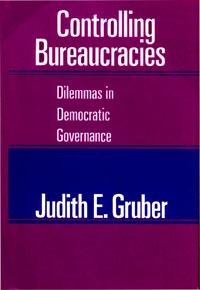 | Title: Controlling bureaucracies: dilemmas in democratic governance Author: Gruber, Judith Emily Published: University of California Press, 1986 Subjects: Politics | Politics Publisher's Description: How can citizens of a democracy exercise control over government officials in ways that allow for effective government? In this book, Professor Gruber merges a sophisticated analysis with empirical research to develop a new approach to this perennial problem. Similar Items |
| 5. |  | Title: A democratic South Africa?: constitutional engineering in a divided society Author: Horowitz, Donald L Published: University of California Press, 1991 Subjects: Politics | African Studies | Sociology | Law Publisher's Description: Can a society as deeply divided as South Africa become democratic? In a most timely work, Donald L. Horowitz, author of the acclaimed Ethnic Groups in Conflict , points to the conditions that make democracy an improbable outcome in South Africa. At the same time, he identifies ways to overcome these obstacles, and he describes institutions that offer constitution makers the best chance for a democratic future.South Africa is generally considered an isolated case, a country unlike any other. Drawing on his extensive experience of racially and ethnically divided societies, however, Horowitz brings South Africa back into African and comparative politics. Experience gained in Nigeria, Botswana, Zimbabwe, and other divided societies around the world is relevant because, as South Africa leaves apartheid behind, it will still confront problems of pluralism: racial, ethnic, and ideological. Countries like South Africa, Horowitz argues, must develop institutions capable of coping with such divisions.Reviewing an array of constitutional proposals for South Africa - group rights, consociation, partition, binationalism, and an enhanced role for the judiciary - Horowitz shows that most are inappropriate for the country's problems, or else run afoul of some major ideological taboo. Institutions that are both apt and acceptable do exist, however. These are premised on the need to create incentives for accommodation across group lines. In the final chapter, Horowitz makes a major contribution to the theory of democratization as he considers how commitments to democracy might be extracted even from political groups with undemocratic objectives.Ranging skillfully across studies of social distance and stereotypes, electoral and party systems, constitutions and judiciaries, conflict and accommodation, and negotiation and democratization, Horowitz displays a broad comparative vision. His innovative study will change the way theorists and practitioners approach the task of making democracy work in difficult conditions. [brief] Similar Items |
| 6. | 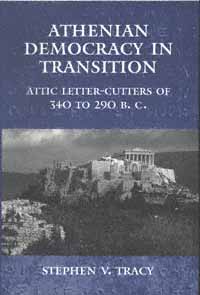 | Title: Athenian democracy in transition: Attic letter-cutters of 340 to 290 B.C Author: Tracy, Stephen V 1941- Published: University of California Press, 1995 Subjects: Classics | Ancient History | Archaeology Publisher's Description: Furthering his masterful new approach to classifying and interpreting epigraphical data presented in Attic Letter-Cutters of 229 to 86 B.C. , Stephen V. Tracy has produced a masterful study of the inscriptions from the time of King Philip of Macedon, Alexander the Great, Demosthenes, and Demetrios. Detailed study of the hands in this largest group of primary documents has enabled him to offer a number of new insights, such as reassessing the career of Demetrios of Phaleron and taking issue with the commonly accepted view that Athenian democracy ended in 322 B.C. with the defeat by the Macedonians at Krannon.Tracy pieces together stone documents and shows that the "handwriting" of individual stonecutters can be identified by the way particular letters are cut into the stone. He offers new readings, redatings, joins and associations, as well as initial publication of some fragments from the excavations in the Athenian agora. [brief] Similar Items |
| 7. |  | Title: Civic wars: democracy and public life in the American city during the nineteenth century Author: Ryan, Mary P Published: University of California Press, 1997 Subjects: History | United States History | Urban Studies | Gender Studies | Ethnic Studies Publisher's Description: Mary P. Ryan traces the fate of public life and the emergence of ethnic, class, and gender conflict in the nineteenth-century city in this ambitious retelling of a key period of American political and social history. Basing her analysis on three quite different cities - New York, New Orleans, and San Francisco - Ryan illustrates how city spaces were used, understood, and fought over by a dazzling variety of social groups and political forces. She finds that the democratic exuberance America enjoyed in the 1820s and 1840s was irrevocably damaged by the Civil War. Civic life rebounded after the War but was, in Ryan's words, "less public, less democratic, and more visibly scarred by racial bigotry."Ryan's analysis is played out on three different levels - the spatial, the ceremonial, and the political. As she follows the decline of informal democracy from the age of Jackson to the heyday of industrial capitalism, she finds the roots of America's resilient democratic culture in the vigorous, often belligerent urban conflicts that found expression in the social movements, riots, celebrations, and other events that punctuated daily life in these urban centers. With its insightful comparisons, meticulous research, and graceful narrative, this study illustrates the ways in which American cities of the nineteenth century were as full of cultural differences and as fractured by social and economic changes as any metropolis today. [brief] Similar Items |
| 8. | 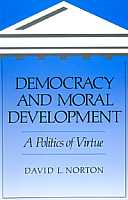 | Title: Democracy and moral development Author: Norton, David L Published: University of California Press, 1990 Subjects: Philosophy | Political Theory | Ethics Publisher's Description: At a time when politics and virtue seem less compatible than oil and water, Democracy and Moral Development shows how to bring the two together. Philosopher David Norton applies classical concepts of virtue to the premises of modern democracy. The centerpiece of the book is a model of organizational . . . [more] Similar Items |
| 9. |  | Title: Labor and imperial democracy in prewar Japan Author: Gordon, Andrew 1952- Published: University of California Press, 1991 Subjects: Asian Studies | Japan | Politics | Asian History | Labor Studies Publisher's Description: Labor and Imperial Democracy in Prewar Japan examines the political role played by working men and women in prewar Tokyo and offers a reinterpretation of the broader dynamics of Japan's prewar political history. Gordon argues that such phenomena as riots, labor disputes, and union organizing can best be understood as part of an early twentieth-century movement for "imperial democracy" shaped by the nineteenth-century drive to promote capitalism and build a modern nation and empire. When the propertied, educated leaders of this movement gained a share of power in the 1920s, they disagreed on how far to go toward incorporating working men and women into an expanded body politic. For their part, workers became ambivalent toward working within the imperial democratic system. In this context, the intense polarization of laborers and owners during the Depression helped ultimately to destroy the legitimacy of imperial democracy.Gordon suggests that the thought and behavior of Japanese workers both reflected and furthered the intense concern with popular participation and national power that has marked Japan's modern history. He points to a post-World War II legacy for imperial democracy in both the organization of the working class movement and the popular willingness to see GNP growth as an index of national glory. Importantly, Gordon shows how historians might reconsider the roles of tenant farmers, students, and female activists, for example, in the rise and transformation of imperial democracy. [brief] Similar Items |
| 10. |  | Title: Rich democracies: political economy, public policy, and performance Author: Wilensky, Harold L Published: University of California Press, 2002 Subjects: Politics | Social Theory | Public Policy | Economics and Business | Sociology Publisher's Description: In this landmark work, the culmination of 30 years of systematic, comprehensive comparison of 19 rich democracies, Wilensky answers two basic questions: (1) What is distinctly modern about modern societies--in what ways are they becoming alike? (2) How do variations in types of political economy shape system performance? He specifies similarities and differences in the structure and interplay of government, political parties, the mass media, industry, labor, professions, agriculture, churches, and voluntary associations. He then demonstrates how differences in bargaining arrangements among these groups lead to contrasting policy profiles and patterns of taxing and spending, which in turn explain a large number of outcomes: economic performance, political legitimacy, equality, job security, safety and risk, real health, the reduction of poverty and environmental threats, and the effectiveness and fairness of regulatory regimes. Drawing on quantitative data and case studies covering the last 50 years and more than 400 interviews he conducted with top decision-makers and advisors, Wilensky provides a richly detailed account of the common social, economic, and labor problems modern governments confront and their contrasting styles of conflict resolution. The result is new light on the likely paths of development of rich democracies as they become richer. Assessing alternative theories, Wilensky offers a powerful critique of such images of modern society as "post-industrial" or "high-tech," "the information age" or the alleged dominance of "globalization." Because he systematically compares all of the rich democracies with at least three million population, Wilensky can specify what is truly exceptional about the United States, what it shares with Britain and Britain abroad (Canada, Australia, New Zealand) and what it shares with all or almost all of the West European democracies, Israel, and Japan. He gives careful attention to which successful social and labor policies are transferable across nations and which are not. Rich Democracies will interest both scholars and practitioners. It combines the perspectives of political economy (the interplay of markets and politics) and political sociology (the social bases of politics). It will be especially useful in courses on comparative political economy, comparative politics, European politics, public policy, political sociology, the welfare state, American government, advanced industrial societies, and industrial relations. [brief] Similar Items |
| 11. |  | Title: The dynamics of the breakthrough in Eastern Europe: the Polish experience Author: Staniszkis, Jadwiga Published: University of California Press, 1991 Subjects: Politics | European History | Sociology Publisher's Description: Understanding the dramatic political, social, and economic changes that have taken place in Poland in the mid-1980s is one key to predicting the future of the communist bloc. Jadwiga Staniszkis, an influential, internationally known expert on contemporary trends in Eastern Europe, provides an insider's analysis that deserves the attention of all scholars interested in the region.Staniszkis presents the breakthrough of 1989 as a consequence not only of systemic contradictions within socialism but also of a series of chance events. These events include unique historical circumstances such as the emergence of the "globalist" faction in Mosow, with its new, world-system perception of crisis, and the discovery of the round-table technique as a productive ritual of communication, imitated all over Eastern Europe. After describing the development, collapse, and reorganization of a "new center" in Poland in 1989-1990, she discusses the first attempt at privatizing the economy. Her analysis of the dilemmas accompanying breakthrough and transition is an invaluable guide to the challenges that face both capitalism and democracy in Eastern Europe. [brief] Similar Items |
| 12. |  | Title: The Jewish state: a century later Author: Dowty, Alan 1940- Published: University of California Press, 1998 Subjects: Jewish Studies | Middle Eastern Studies | Politics Publisher's Description: As the fiftieth anniversary of Israeli statehood approaches, along with the commemoration of the hundredth anniversary of the World Zionist Organization, the question of what is meant by a "Jewish" state is particularly timely. Alan Dowty takes on that question in a book that is admirable for its clarity and its comprehensive interpretation of the historical roots and contemporary functioning of Israel.Israeli nationhood, democracy, and politics did not unfold in a social or political vacuum, but developed from power-sharing practices in pre-state Jewish communities in Palestine and in Eastern Europe. Dowty elucidates the broad cluster of cultural, historical, and ideological tenets which came to comprise Israel's contemporary political system. He demonstrates that such tenets were not arbitrary but in fact developed logically from Jewish political habits and the circumstances of time. Dowty illustrates how these traditions are balanced with those of ideology and modernization, and he provides an integrated, sophisticated analysis of the Israeli nation's formation and present state.Dowty also proposes thoughtful answers to puzzles regarding the strengths and weaknesses of Israeli democracy in responding to the challenges of communal divisions, religious contention, the country's non-Jewish minority, and accommodation with the Palestinians. The Jewish State will be invaluable for anyone looking for that one book that gives an intelligent overview of both Israel today and of its origins. [brief] Similar Items |
| 13. | 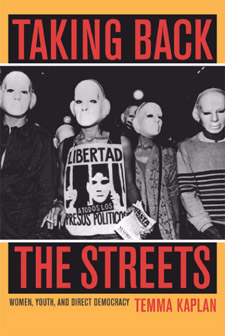 | Title: Taking back the streets: women, youth, and direct democracy Author: Kaplan, Temma 1942- Published: University of California Press, 2004 Subjects: History | Politics | Anthropology | Latin American Studies | European Studies | Women's Studies | Sociology Publisher's Description: Toward the end of the twentieth century in places ranging from Latin America and the Caribbean to Europe, the United States, South Africa, Nigeria, Iran, Japan, China, and South Asia, women and young people took to the streets to fight injustices they believed they could not confront in any other way. In the hope of changing the way politics is done, they called officials to account for atrocities they had committed and unjust laws they had upheld. They attempted to drive authoritarian governments from power by publicizing the activities these officials tried to hide. This powerful book takes us into the midst of these movements to give us a close-up look at how a new generation bore witness to human rights violations, resisted the efforts of regimes to shame and silence young idealists, and created a vibrant public life that remains a vital part of ongoing struggles for democracy and justice today. Through personal interviews, newspaper accounts, family letters, and research in the archives of human rights groups, this book portrays women and young people from Argentina, Chile, and Spain as emblematic of others around the world in their public appeals for direct democracy. An activist herself, author Temma Kaplan gives readers a deep and immediate sense of the sacrifices and accomplishments, the suffering and the power of these uncommon common people. By showing that mobilizations, sometimes accompanied by shaming rituals, were more than episodic - more than ways for societies to protect themselves against government abuses and even state terrorism - her book envisions a creative political sphere, a fifth estate in which ordinary citizens can reorient the political practices of democracy in our time. [brief] Similar Items |
| 14. |  | Title: From popular sovereignty to the sovereignty of law: law, society, and politics in fifth-century Athens Author: Ostwald, Martin 1922- Published: University of California Press, 1987 Subjects: Classics | Classics | Classical History | Classical Politics Publisher's Description: Analyzing the "democratic" features and institutions of the Athenian democracy in the fifth century B.C., Martin Ostwald traces their development from Solon's judicial reforms to the flowering of popular sovereignty, when the people assumed the right both to enact all legislation and to hold magistr . . . [more] Similar Items |
| 15. |  | Title: The enigma of 1989: the USSR and the liberation of Eastern Europe Author: Lévesque, Jacques Published: University of California Press, 1997 Subjects: Politics | History | European History | Russian and Eastern European Studies Publisher's Description: The Soviet external empire fell in 1989 virtually without bloodshed. The domino-like collapse of the communist regimes of Eastern Europe was not anticipated by political experts in either the East or the West. Most surprising of all was the Soviet Union's permissive reactions to the secession. For the first time in modern history, such an epochal upheaval could take place not only without war but also without major international tensions.This book is the first comprehensive scholarly attempt to elucidate Soviet behavior toward Eastern Europe in 1989. Jacques Lévesque thoroughly analyses the policies of the USSR toward Eastern Europe during the Gorbachev era and clarifies the goals that underpinned these policies.Based on interviews with political leaders and exhaustive research in Russia, Czechoslovakia, Hungary, Poland, and the other ex-Warsaw Pact countries, this book traces the nuances of each country's case as a set of continually changing, mutually reinforcing causes and effects. [brief] Similar Items |
| 16. |  | Title: Latin America in the 1940's: war and postwar transitions Author: Rock, David 1945- Published: University of California Press, 1994 Subjects: History | Politics | Latin American History | Latin American Studies Publisher's Description: Latin America in the 1940s addresses the significant impact that World War II and the onset of the Cold War had on the political development of Latin America. During the middle of this crucial decade many Latin American countries turned from authoritarian regimes toward democracy and the rapid growth of labor unions. By the end of the decade, however, the fledgling democracies had collapsed, the unions were in shambles, and authoritarianism asserted itself once more. This collection of essays by an international group of historians, political scientists, economists, and sociologists confronts a central debate in Latin American studies: Were these events the immediate result of external forces - that is, of the war - or the culmination of internal movements that originated in the 1930s?This book is among the first in its field to evaluate the early Cold War period through the lens of the immediate post-Cold War era. While powerfully reinterpreting the brief resurgence of democracy in Latin America in the 1940s, it offers a comparative foundation from which to judge the renewed trend toward democracy that began in the 1980s and continues during the early 1990s. [brief] Similar Items |
| 17. | 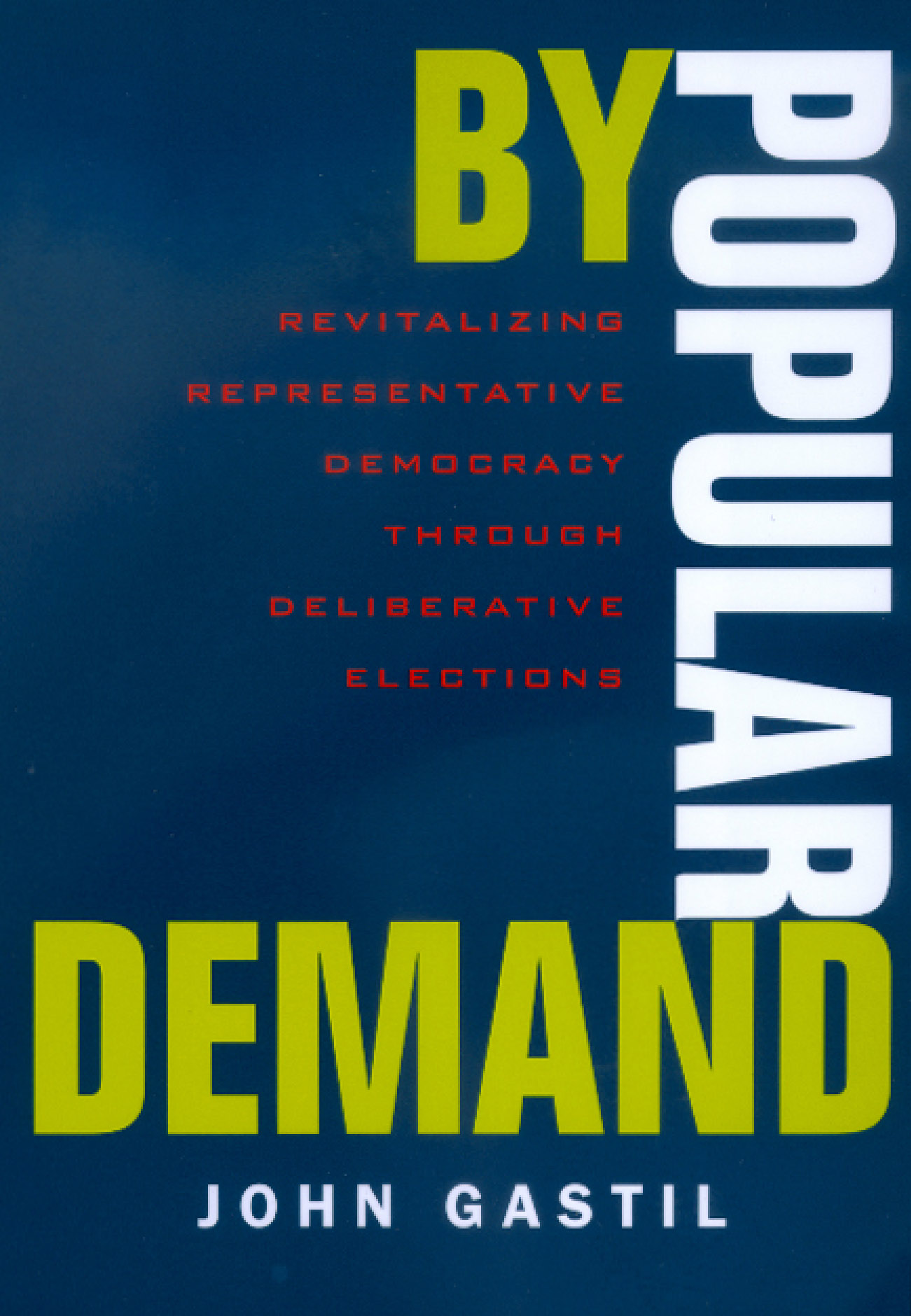 | Title: By popular demand: revitalizing representative democracy through deliberative elections Author: Gastil, John Published: University of California Press, 2000 Subjects: Politics Publisher's Description: John Gastil challenges conventional assumptions about public opinion, elections, and political expression in this persuasive treatise on how to revitalize the system of representative democracy in the United States. Gastil argues that American citizens have difficulty developing clear policy interests, seldom reject unrepresentative public officials, and lack a strong public voice. Our growing awareness of a flawed electoral system is causing increased public cynicism and apathy. The most popular reforms, however, will neither restore public trust nor improve representation. Term limits and campaign finance reforms will increase turnover, but they provide no mechanism for improved deliberation and accountability. Building on the success of citizen juries and deliberative polling, Gastil proposes improving our current process by convening randomly selected panels of citizens to deliberate for several days on ballot measures and candidates. Voters would learn about the judgments of these citizen panels through voting guides and possibly information printed on official ballots. The result would be a more representative gov-ernment and a less cynical public. America has a long history of experimentation with electoral systems, and the proposals in By Popular Demand merit serious consideration and debate. [brief] Similar Items |
| 18. | 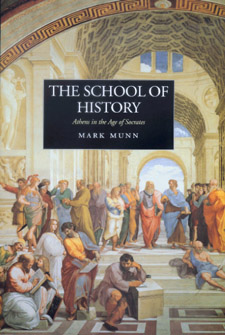 | Title: The school of history: Athens in the age of Socrates Author: Munn, Mark Henderson Published: University of California Press, 2000 Subjects: Classics | Classical History | Ancient History | Classical Politics Publisher's Description: History, political philosophy, and constitutional law were born in Athens in the space of a single generation--the generation that lived through the Peloponnesian War (431-404 b.c.e.). This remarkable age produced such luminaries as Socrates, Herodotus, Thucydides, Sophocles, Euripides, Aristophanes, and the sophists, and set the stage for the education and early careers of Plato and Xenophon, among others. The School of History provides the fullest and most detailed intellectual and political history available of Athens during the late fifth century b.c.e., as it examines the background, the context, and the decisive events shaping this society in the throes of war. This expansive, readable narrative ultimately leads to a new understanding of Athenian democratic culture, showing why and how it yielded such extraordinary intellectual productivity. As both a source and a subject, Thucydides' history of the Peloponnesian War is the central text around which the narrative and thematic issues of the book revolve. Munn re-evaluates the formation of the Greek historiographical tradition itself as he identifies the conditions that prompted Thucydides to write--specifically the historian's desire to guide the Athenian democracy as it struggled to comprehend its future. The School of History fully encompasses recent scholarship in history, literature, and archaeology. Munn's impressive mastery of the huge number of sources and publications informs his substantial contributions to our understanding of this democracy transformed by war. Immersing us fully in the intellectual foment of Athenian society, The School of History traces the history of Athens at the peak of its influence, both as a political and military power in its own time and as a source of intellectual inspiration for the centuries to come. [brief] Similar Items |
| 19. |  | Title: Decades of crisis: Central and Eastern Europe before World War II Author: Berend, T. Iván (Tibor Iván) 1930- Published: University of California Press, 1998 Subjects: History | European History | European Studies | Russian and Eastern European Studies | Economics and Business Publisher's Description: Only by understanding Central and Eastern Europe's turbulent history during the first half of the twentieth century can we hope to make sense of the conflicts and crises that have followed World War II and, after that, the collapse of Soviet-controlled state socialism. Ivan Berend looks closely at the fateful decades preceding World War II and at twelve countries whose absence from the roster of major players was enough in itself, he says, to precipitate much of the turmoil.As waves of modernization swept over Europe, the less developed countries on the periphery tried with little or no success to imitate Western capitalism and liberalism. Instead they remained, as Berend shows, rural, agrarian societies notable for the tenacious survival of feudal and aristocratic institutions. In that context of frustration and disappointment, rebellion was inevitable. Berend leads the reader skillfully through the maze of social, cultural, economic, and political changes in Hungary, Czechoslovakia, Yugoslavia, Poland, Romania, Bulgaria, Albania, Austria, Latvia, Lithuania, Estonia, and the Soviet Union, showing how every path ended in dictatorship and despotism by the start of World War II. [brief] Similar Items |
| 20. | 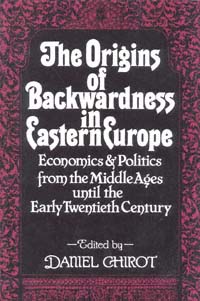 | Title: The origins of backwardness in Eastern Europe: economics and politics from the Middle Ages until the early twentieth century Author: Chirot, Daniel Published: University of California Press, 1989 Subjects: History | European History | Politics | Economics and Business Publisher's Description: Reaching back centuries, this study makes a convincing case for very deep roots of current Eastern European backwardness. Its conclusions are suggestive for comparativists studying other parts of the world, and useful to those who want to understand contemporary Eastern Europe's past. Like the rest of the world except for that unique part of the West which has given us a false model of what was "normal," Eastern Europe developed slowly. The weight of established class relations, geography, lack of technological innovation, and wars kept the area from growing richer.In the nineteenth century the West exerted a powerful influence, but it was political more than economic. Nationalism and the creation of newly independent aspiring nation-states then began to shape national economies, often in unfavorable ways.One of this book's most important lessons is that while economics may limit the freedom of action of political players, it does not determine political outcomes. The authors offer no simple explanations but rather a theoretically complex synthesis that demonstrates the interaction of politics and economics. [brief] Similar Items |